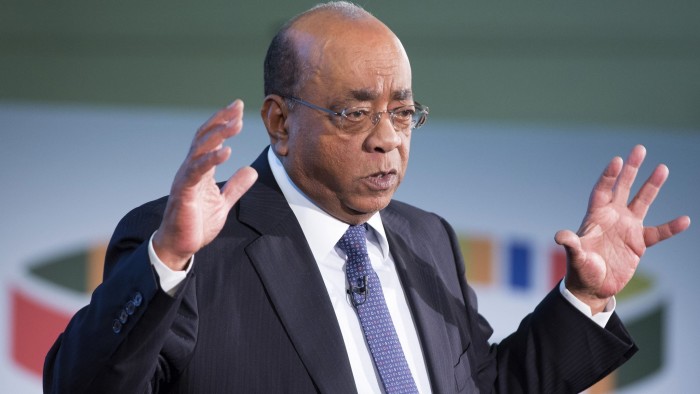The empty-chair syndrome in African leadership


Roula Khalaf, Editor of the FT, selects her favourite stories in this weekly newsletter.
When Liu Xiaobo, the Chinese democracy advocate, won the Nobel Peace Prize, his award ceremony was overshadowed by an empty chair. That is because Mr Liu was otherwise engaged, rotting in a Chinese jail. Africa’s rough equivalent of the Nobel Prize, the Ibrahim Prize for Achievement in African Leadership, also suffers from empty-chair syndrome. In five of the 10 years since it was launched with great fanfare in 2006, no leader was deemed worthy.
That is what happened last week when the selection committee again announced there would be no winner of the $5m prize. That $5m, plus a $200,000 pension, has sometimes been described as a bribe for African leaders to quit office. To be eligible, a leader must have stepped down voluntarily. But as Mo Ibrahim, the Sudanese-British telecoms magnate who established the prize, wryly points out, any African leader bent on wealth accumulation can do much better than that.
Rather, he says, the award is for exceptional leadership. He ventures that few, if any, western leaders would have won this year. To hold African leaders to a lesser standard, by rewarding them simply for obeying the constitution, would be to demean the prize and, more importantly, to subject Africa to something from which it too often suffers: low expectations.
That is presumably why Goodluck Jonathan did not win. The Nigerian president garnered plaudits for stepping down after losing elections last year to former general Muhammadu Buhari. Indeed, he was the first civilian leader in Nigeria to do so. But like Shakespeare’s Thane of Cawdor, nothing became Mr Jonathan quite so much as his departure. In office, his government wasted one of the biggest oil booms in history, presided over a level of corruption prodigious even by Nigerian standards and allowed Boko Haram to gain terrible traction. To have recognised this performance would have been like giving Henry Kissinger some kind of peace accolade. Oh, whoops!
One of the laudable purposes of the prize is to highlight the achievements of unsung heroes in a continent where we all too often think of leaders as either monsters or thieves. This is a great shame. As Salim Ahmed Salim, Tanzania’s veteran diplomat and chair of the Ibrahim Prize committee, says, Africa’s problems are more severe and complex than in many continents and African leaders have fewer resources with which to tackle them. Leaders who do well in such circumstances are not just good, they are exceptional.
Apart from Nelson Mandela, past recipients are still not household names. They include Pedro Verona Pires of Cape Verde, one of the few African freedom fighters to make a successful transition to leadership. In 2011, he stood down as president of his island archipelago, leaving it more prosperous, healthy and democratic than when he was elected 10 years earlier. Other recipients are last year’s winner, Hifikepunye Pohamba of Namibia, who is credited with forging national cohesion and stepping up the fight against Aids; Festus Mogae of Botswana, who continued the legacy of one of Africa’s best-run states; and Joaquim Chissano of Mozambique, the inaugural winner, who helped bring peace after years of civil war.
“We have,” Mr Ibrahim told me, “some unsung leaders, who did some really great work and who left quietly.”
But is African leadership slipping back? Not so long ago, it appeared to be on an upward trend. Now, in South Africa we have Jacob Zuma, a president who makes the brilliant, if deeply flawed, Thabo Mbeki a figure of nostalgia. In Angola, where health and education levels are appalling, the government of José Eduardo dos Santos has squandered the country’s oil patrimony while busily enriching itself.
Across the Great Lakes region, from the Democratic Republic of Congo to Uganda and Burundi, leaders are clinging on well beyond their sell-by dates. Even Paul Kagame, a leader lauded for his organisational brilliance and focus on development, has soured his reputation by suppressing, rather than encouraging, those who might replace him.
One possible objection to past prize winners is that they come from small states. Botswana, Namibia and Cape Verde have a combined population of less than 5m. No one from the Democratic Republic of Congo (85m) or Nigeria (180m and counting), has been deemed worthy. When a leader of one of Africa’s largest nations finally clinches the prize, it will be time to declare that Africa’s leadership has turned a corner. The world may not be watching with bated breath. But it should be.
Comments